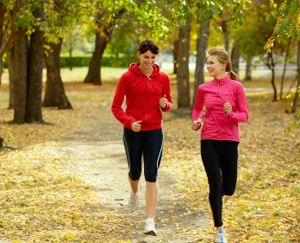Gluten Free
What does following a gluten-free diet mean? That you're embarking on an easy diet with a wide range of health-promoting effects. Instead of dwelling on what you’re giving up, consider that you’re going to enjoy a whole new world of delicious food options to meet your special dietary needs. You’ll be eating seasonally, choosing more fresh fruits and vegetables, focusing on meats, seafood, poultry, legumes, lentils, corn, and rice, and discovering fascinating ancient grains such as quinoa, amaranth, and millet. You’ll be able to eat potatoes, eggs, most cheeses, even chocolate (!)—and enjoy them without guilt because you’ll be taking good care of your body. In fact, you’ll probably end up eating—and feeling—better than ever!
Visit this page for more information about living Gluten Free
---
We carry a large variety of gluten free items, the brands listed below represent just some of the offerings we carry















More Diets
- By Kimberly Beauchamp
Exercise to Outdistance the Common Cold
It’s an old line, but it bears repeating: staying physically fit improves your overall health. From preventing heart disease to shaving days off the common cold, exercise really is the miracle anti-drug.
If you’re like many people, getting out to exercise on the darkest days of the year may be the last thing that appeals but the rewards are more than worth the unpleasant temperatures and slushy sidewalks. As a study in the British Journal of Sports Medicine reports, people who are in better physical shape and get at least 20 minutes of aerobic exercise on five or more days per week are not only much less likely to get a cold, but will also have milder symptoms than those who are less fit and don’t exercise as much.
More than 200 different viruses cause the common cold, so while you can’t catch the same one twice, chances are good that there are still plenty out there you just haven’t been exposed to yet. Most adults catch about two to four colds per year; children usually get six to ten. Lining the shelves of every pharmacy and health food store are dozens of different formulas that claim to ease the severity and duration of the cold, but prevention may still be the best medicine.
From preventing heart disease to shaving days off the common cold, exercise really is the miracle anti-drug
Run away from that cold
To study the connection between physical fitness and the likelihood of catching a cold, US researchers looked at 1,002 men and women, ages 18 to 85, for 12 weeks during the fall and winter months. Before the study began, the people rated their own fitness level and gave information about how often and what types of exercise they engaged in. If they caught a cold, the participants rated the severity of their symptoms and noted how long their illness lasted.
The number of days with a cold in people who exercised five or more days per week was reduced by 43%; the number of days sick for those in the “most fit” category went down 46% compared with those in the less fit groups. The severity of symptoms was also significantly less in people who got regular physical exercise and were more fit.
Beat the cold with these strategies
Get your rest. Proper restful sleep is vital to a healthy body and mind. Aim for eight hours per night, or more if you need it. Getting enough sleep improves heart and immune system health, and when you have a cold, rest is vital to the healing process. It is during the sleeping hours that the body does its repair work. Skimp on sleep and it will probably take longer to get back on your feet.
Eat well. Sugar suppresses the immune system, and the same goes for juices and other concentrated sweeteners. Focus on foods that contain complex carbs (like whole grains and legumes) and a variety of richly colored fruits and vegetables. And don’t forget the chicken soup if you do get a cold. The steam helps loosen congestion and the mineral-rich broth helps keep you hydrated.
Exercise, in moderation. People who regularly engage in intense physical exercise (like training for a marathon) are actually more likely to get sick. This type of exercise is tough on the body, increasing levels of inflammatory molecules and suppressing the immune system. Moderate activity seems to be the best for immune health; try jogging, fast-paced walking, swimming, or cycling.
(Br J Sports Med 2010;45)











